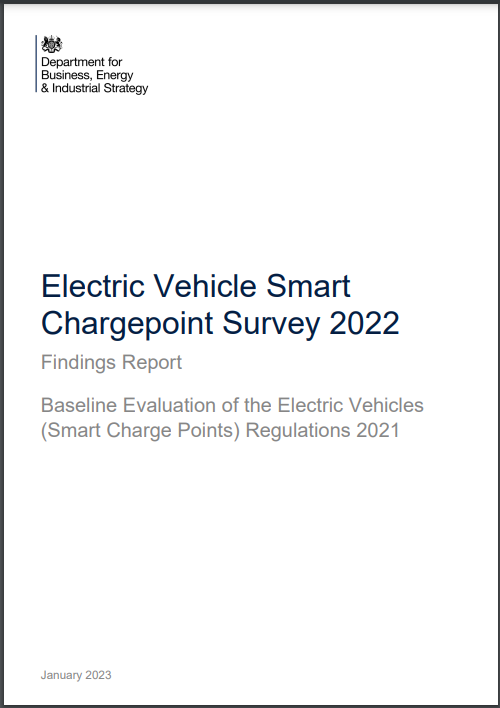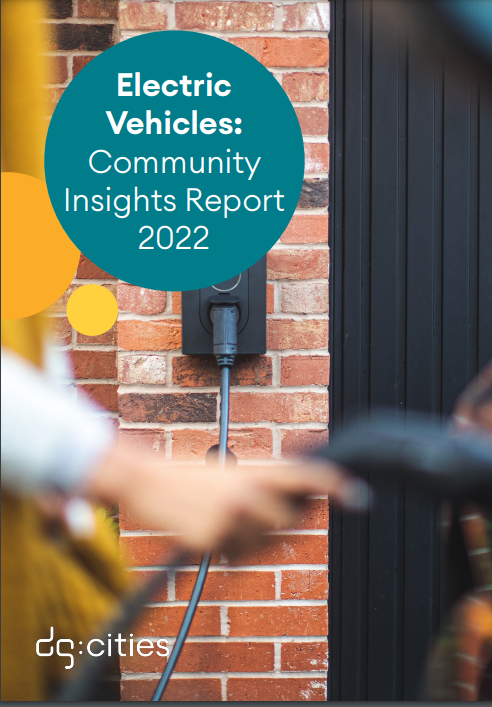Some of the barriers that deter consumers from making the switch from petrol and diesel to electric vehicles include anxiety around charger availability and range. There are a number of technologies available to mitigate these concerns. But are the public aware of the smart capabilities of home charging, for example? To better understand perceptions of EV charging, the Department for Business, Energy and Industrial Strategy (BEIS) asked DG Cities to conduct a national survey. The results shed light not only on consumer attitudes, but also on areas where improvements are needed to accelerate EV adoption. On the day of the report’s publication, Head of Research and Service Design, Ed Houghton introduces the findings.
Exploring how consumers understand EV smart charging
Transport is the largest contributor to UK domestic greenhouse gas (GHG) emissions, responsible for 27% in 2019. As such, it is an area requiring rapid transition to low/no carbon alternatives. [1] Battery electric vehicles (EVs) and plug-in hybrid electric vehicles (PHEVs) have become an increasing presence on our roads – one in ten new vehicles purchased in 2022 were EVs, with sales increasing by 40%. [2] This trend has been growing year on year, as more vehicles enter the market offering more choice and more competitive price points.
A big challenge, however, is how to ensure the UK has the necessary charging infrastructure to support the transition to electric vehicles. Range anxiety is a known concern among drivers. For a long time, worries about when and how to charge have prevented people from switching to EVs. One of the benefits of EVs over internal combustion engine (ICE) vehicles is the relative ease with which they can be charged form home, if consumers can afford to, and have access to a home chargepoint. As sales of EVs have increased, sales and installations of home chargepoints have lagged behind, even though new smart functionalities have come to the market. Smart charging is a benefit as it enables consumers to manage how and when to home-charge their EV and to control charging remotely.
But to what extent are consumers aware of the value of smart chargepoints? And how clear are their different functions to consumers, given the number of chargepoints on the market? In 2022, we were asked to help the Government answer these questions. The DG Cities team undertook a national survey of EV consumers to find out more.
The first national survey of EV smart chargepoint attitudes and consumer behaviours
DG Cities was excited to be asked by the Department for Business, Energy and Industrial Strategy to explore this area in detail through a national survey of EV consumers, and to provide a useful baseline for new regulations designed to support improvements in the smart chargepoint market.
Working with BEIS, we delivered a literature review of recently published data and insights to develop a survey that captured views and behaviours. We partnered with YouGov to develop the national sample of EV and hybrid vehicle owners to distribute the survey among. We developed questions that investigated various aspects of vehicle charging – including preferences over location, charging time and chargepoint functions – and we asked respondents to share their views and interest in purchasing a smart chargepoint in the future.
Findings
Our survey was completed by over 1,002 electric vehicle and plug-in electric vehicle owners in March 2022. Some of the key findings were:
Most battery EV owners have a dedicated chargepoint at home: Two-thirds (66%) of battery-electric car drivers have a dedicated chargepoint at home. However, the majority (66%) of respondents with battery-electric vans have a 3-pin cable as their main charger, which doesn’t allow charge scheduling.
Smart functions are increasingly prevalent: The top three functions are charge scheduling (41%), connecting to the vehicles on-board computer (39%) and internet connectivity (36%). This indicates that many of the chargepoints EV drivers own have at least some degree of ‘smartness’.
For those who schedule their smart charging, most have a positive experience: The majority agree that they can view their current charging schedule with ease (67%); change the charging schedule with ease (63%) and monitor the cost of their charging with ease (77%).
Overriding schedules is common, which may have an impact on the grid at times of high load: The results show that a quarter (26%) of participants never override their charging schedule. However, over half override their schedule up to 50% of the time. A few respondents override every time they charge, suggesting that they may not have the scheduled charging set up to suit their needs.
Workplace charging is still uncommon: A third (30%) of participants use workplace charging. Over 60% say that their workplace either does not have the facilities, that they do not go to a physical workplace or choose not to drive to work.
Growing smart charging in the future
Our work for BEIS highlights that there is growing interest amongst consumers of smart functionalities, particularly the ability to schedule charging. There are, however, some barriers that need to be overcome for consumers, particularly when it comes to the complexity of the products on offer, and standardisation of chargepoint technologies.
Data and insights of this type are important for industry and policymakers to understand progress towards net zero. DG Cities is excited to have partnered on this work, and we’re looking forward to seeing how industry, and adoption by consumers, evolves in the future.
To read the new research, click here. To find out more about our research into consumer behaviour when it comes to EVs and some of the projects we have been working on in this field, download our Electric Vehicles Community Insights Report, 2022.



